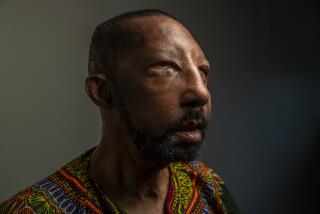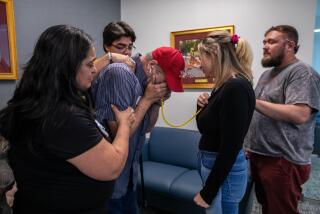U.S. Seeks to Overhaul Organ Transplant Policy
- Share via
When his wife of 29 years suffered a massive brain hemorrhage more than eight years ago, Frank MacLean and his family had two agonizing decisions to make. The first was to discontinue life support, and the second was to donate her organs.
Family members were unanimous in deciding to stop life support once doctors told them that Socorro Elvia MacLean’s brain had stopped functioning. Donating her organs, however, was a more difficult matter.
“I didn’t want to do it,” said Frank MacLean, manager of Dearde’s Home Furnishings in Huntington Park. “I didn’t want to take anything away from my wife.”
MacLean said he was not sure if his wife, a devout Roman Catholic from Mexico, would have agreed to donating. But when the hospital’s transplant coordinator “said that there were two people who needed kidneys, and my wife was a perfect match,” MacLean said, “I couldn’t tell her no.”
The recipients of the kidneys were two Latino men--one 17 years old, another 63--whose fates had hung in the balance while they waited for a donor.
Trying to find the perfect match is not easy for anyone on a transplant waiting list, but it is particularly worrisome for minorities because the best matches statistically come from donors of the same race. And although minorities make up about 40% of those waiting for an organ, they constitute less than a quarter of those donating.
Significant ethnic disparities exist in transplant waiting times, experts say. A recent government report confirms that black kidney patients, for instance, wait an average of three years nationwide, twice the time for whites.
In 1997, more than 4,300 people--a third of whom were minorities--died in the United States while awaiting a transplant.
It is against this grim backdrop that the federal government is proposing to reverse those statistics with a controversial overhaul of the nation’s transplant policy.
The U.S. Department of Health and Human Services is poised to implement new regulations designed to shift the focus in allocation from geography to medical need, giving organs to the sickest patients first, regardless of where they live.
With few exceptions, organs are now distributed geographically, offered first to patients in a local community before becoming available to other regions.
In a dramatic illustration of the effects of location, figures from a comprehensive government report released last month revealed that liver patients needing transplants might wait 46 days in Iowa, but 721 days in western Pennsylvania. Similar disparities were found between New York, where a typical liver patient might wait 511 days for a transplant, and the state’s neighbor, New Jersey, where waiting times average 56 days.
Supporters of the proposed rules cite this new data as confirmation of the need to distribute organs to the sickest patients first, no matter where they live.
The proposal, however, is being sharply contested by opponents within the transplant community. Opponents such as the United Network for Organ Sharing argue that organs given to patients who are extremely ill have a higher rate of transplant failure. In addition, local transplant centers could lose out as organs go to larger regional programs, which typically attract more patients.
The Institute of Medicine is now reviewing the current system and the new rule, which is set to take effect in October.
Problem of Matches Hits Minorities Hard
Although proponents believe it will benefit the majority of those awaiting an organ transplant, the new regulations hold particular hope for minorities, where the problem of matching donors to recipients is exacerbated. If the sickest patients receive the organs first, as the rule will mandate, then minorities should benefit the most, experts theorize.
Part of the racial disparity in waiting time is due to the disproportionate number of minorities affected by diseases that lead to the need for transplants. African Americans and Latinos, for instance, are at higher risk for high blood pressure and diabetes than whites and are thus more likely to suffer from end-stage kidney disease.
The issue of minority organ donation was revived recently by the case of an African American adolescent in San Francisco whose kidney--donated to her by her father in 1996--was failing. Rather than risk a long waiting period for another transplant, David Patterson offered to donate his remaining kidney to Renada Daniel Patterson, 16.
A committee at UC San Francisco concluded that transplanting a patient’s last kidney was unethical. But the teenager’s mother, Vickie Daniel, used the media spotlight to draw attention to the need for more people, particularly minorities, to donate their organs.
“I think it’s just ludicrous to have people die when there are great organs to have out there,” said Daniel.
Trying to find other ways to close the gap has some physicians debating the benefits of de-emphasizing genetic matching in the organ allocation point system, which now puts minorities at a disadvantage.
Complex Point System in Place
Matching donors’ organs with recipients involves a complex point system devised by the United Network for Organ Sharing. Transplants are typically given to the recipient with the most points. Factors such as time spent on the waiting list and medical urgency are taken into account.
But for the kidneys, the organs most needed in minority transplants, the largest number of points are given to matches based on blood type and the presence of six histo-compatability antigens, the proteins on a cell surface that trigger a body’s immune system to attack.
The best antigen matches come from members of the same family, with siblings being the closest, followed by parents and, eventually, members of the same race. Because fewer minority organs are available to be genetically matched to recipients, minorities tend to get fewer points while waiting for transplants.
Dr. Cass Franklin, transplant surgeon and former chair of the minority affairs committee at United Network for Organ Sharing, notes that not all organs require such a high degree of antigen matching. For instance, antigens are not matched for livers and hearts because they do not provoke the same degree of rejection as kidneys. As a result, the wide disparities in waiting time for minorities diminish when those organs are considered.
Beyond that, Dr. John Fung, a transplant surgeon at the University of Pittsburgh Medical Center, says that less weight should be put on matching because improvements in immunosuppressant drugs help boost the chances of transplant success, even among organs that have few or no antigen matches.
“The chance for [minorities] to get better equity would be enhanced by getting rid of points,” he said. But matching accounts for only some of the problems of minority organ donation.
Other obstacles include lack of awareness about transplants, religious concerns regarding the state of the body after death and a distrust of doctors.
Some of these concerns were identified 17 years ago when Dr. Clive Callender, a black transplant surgeon at Howard University in Washington, and his colleagues began to explore the low donation rates among African Americans.
The focus expanded to other minority groups and led to establishment of the national Minority Organ Tissue / Transplant Education Program in 1993. Reaching minority communities through churches, schools and other common gathering places is one of the program’s goals. Coordinators are also working to address deep cultural or religious beliefs about dying “whole,” a belief that keeps many minorities from donating.
Maria Zepeda of Hayward said such beliefs were prevalent in her Mexican family. “I always told my mom or my dad about donating,” she said, “but some of the family, they didn’t like the idea.”
She said that she never objected to donating, but that her parents were reluctant, believing that it was important to be “complete” in death. When Zepeda’s son was born with end-stage renal disease, she become an even stronger advocate of donation. Jose, now 13, has been waiting for a kidney since 1990.
Doctors say finding a match for Jose has been particularly difficult because a failed transplant when the boy was 3 left him with a very high level of antibodies.
For Jose and his family, the wait has been tortuous. “It hurts me seeing him lying there,” said his mother. “Once in a long while, he says he doesn’t care, that he wants to die.”
But perhaps the most formidable challenge to increasing organ donation is overcoming the sense of distrust many minorities have of the medical community.
A 1993, Gallup poll of more than 6,000 U.S. adults--the most recent of its kind--found that blacks and Hispanics were more likely than whites to believe that racial discrimination prevents minority patients from receiving the transplants they need, and that organs are more likely to go to the wealthy.
In an attempt to alleviate some of this distrust, outreach programs such as the ones pioneered by the minority transplant program include facts that demystify the organ donation and transplant process. In addition, almost all the major organ donation Web sites have sections devoted solely to the more common myths surrounding transplantation, including the one that you can sell organs, which is illegal.
The federal Health and Human Services Department also hopes a national organ donor initiative launched last year will help alleviate the critical shortage of organs. Up to $7 million of the department’s 1999 budget has been targeted for the initiative, which includes changes in hospital death notification policies and targeted education programs.
Some organ procurement organizations also are trying to use a transplant coordinator who is of the same race as the donor family, when possible. Phyllis Weber, executive director of the California Transplant Donation Network, said consent rates doubled to 60% in the Latino community within six months after bringing in a Latino “organ requester” in 1997. Weber was impressed enough to add a second Latino requester to her staff.
Although the race of the transplant coordinator seems to help increase consent rates, MacLean of Huntington Park said that what mattered most to him was the attitude of the requester, who in his case was white.
“This young lady, I’ll never forget her,” MacLean said. “She was the nicest person in the world.”
MacLean said the woman helped persuade him that he was saving the lives of others. “When we received a letter saying two people were living with [my wife’s] kidneys,” said MacLean, “we got together to laugh, to cry. We knew that some part of mom is living. That was the best moment of our life.”
(BEGIN TEXT OF INFOBOX / INFOGRAPHIC)
Minority Organ Donors in Demand
The critical shortage of organs is particularly acute among minorities, who account for up to 40% of those waiting for a transplant, but less than a quarter of those donating. This difference has made it more difficult to find matches for many on waiting lists, especially those in need of a kidney or pancreas.
Median Waiting Time (in days)
*--*
Kidney Liver Pancreas Heart Lung White 553 280 384 210 549 Black 1,082 243 760 216 619 Latino 897 270 763 125 494 Asian 1,018 299 N/A 80 449 Other 1,048 261 N/A 275 248
*--*
Note: Figures cover 1994-96; kidney figures cover 1993-1995.
Donors of Living and Cadaver Organs
*--*
1988 Percentage 1997 Percentage White 4,785 81% 6,378 68% Black 569 10 1,051 11 Latino 429 7 926 10 Asian 59 1 164 2 Other 57 1 76 1 Race unspecified 5 * 685 7
*--*
* Less than 1%
Note: Figures are through Nov. 3, 1998; percentages may not total 100 because of rounding.
Source: United Network for Organ Sharing
More to Read
Sign up for Essential California
The most important California stories and recommendations in your inbox every morning.
You may occasionally receive promotional content from the Los Angeles Times.













